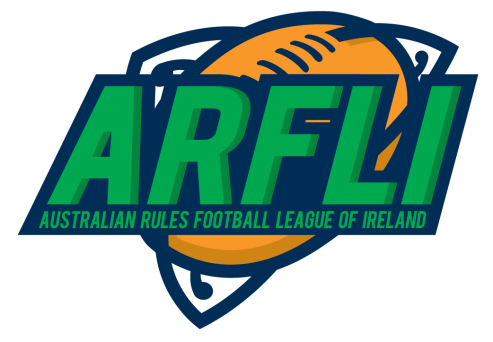
As far a domestic competition goes, there were no official footy clubs in Ireland until 1999, when teams were formed in both Belfast and Dublin (the Redbacks and Demons, respectively). The following year, the Australian Rules Football League of Ireland (ARFLI) was founded, and the Demons and Redbacks began playing test matches against teams in England. Having recruited well, both clubs performed admirably, providing a strong foundation for footy to grow in the Emerald Isle. Three more clubs — the Leeside Lions, the Midland Tigers, and the Drogheda Dockers — were founded within the next year, helped by an established group of Aussie expats.
ARFLI’s co-founders, Ciaran O’Hara and Michael Currane, attempted to strengthen ties with other organized footy clubs and leagues in both the UK and Continental Europe, helping form the European Australian Rules Football Council in early 2001. This was a key development in the eventual formation of AFL Europe in 2010, of which Ireland was a founding member.
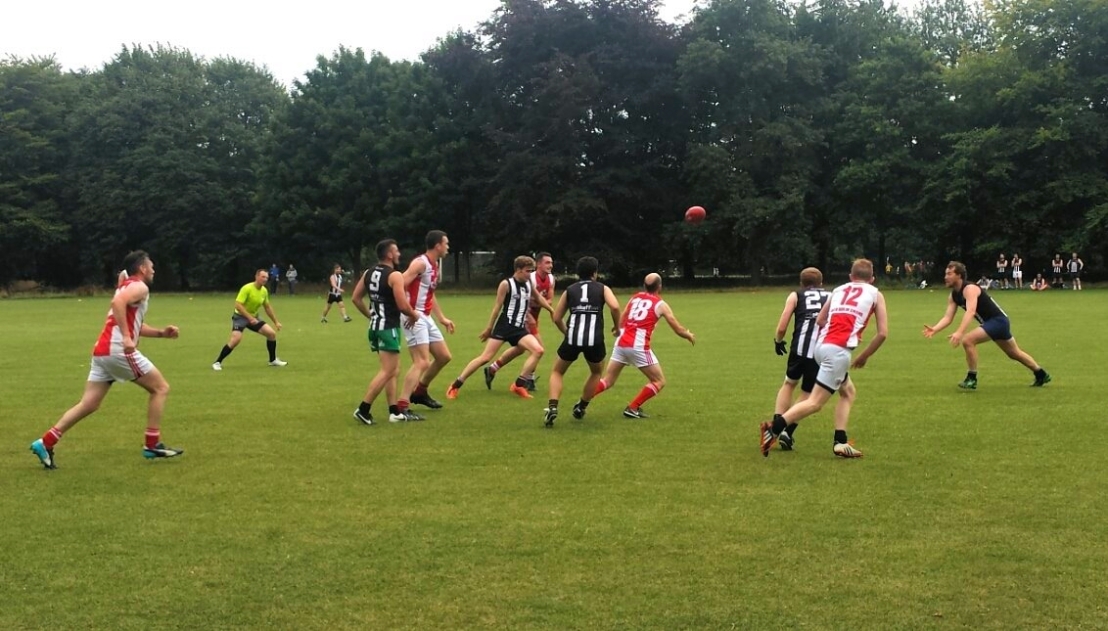
Due to a lack of available cricket ovals, the ARFLI originally decided to create two competitions, starting in the 2001 season. The premiership season was the original five teams competing in traditional 18-a-side formats, while the Super 9’s competition was nine-per-side, and was played on Gaelic football pitches in order to give players a smoother transition.
In addition to a growing local competition, Ireland’s national footy team, the Warriors, were inaugural members of the International Cup in 2002, when they won the premiership over heavily-favored Papua New Guinea, in addition to prior victories over Canada, Samoa, New Zealand, South Africa, and the United States.
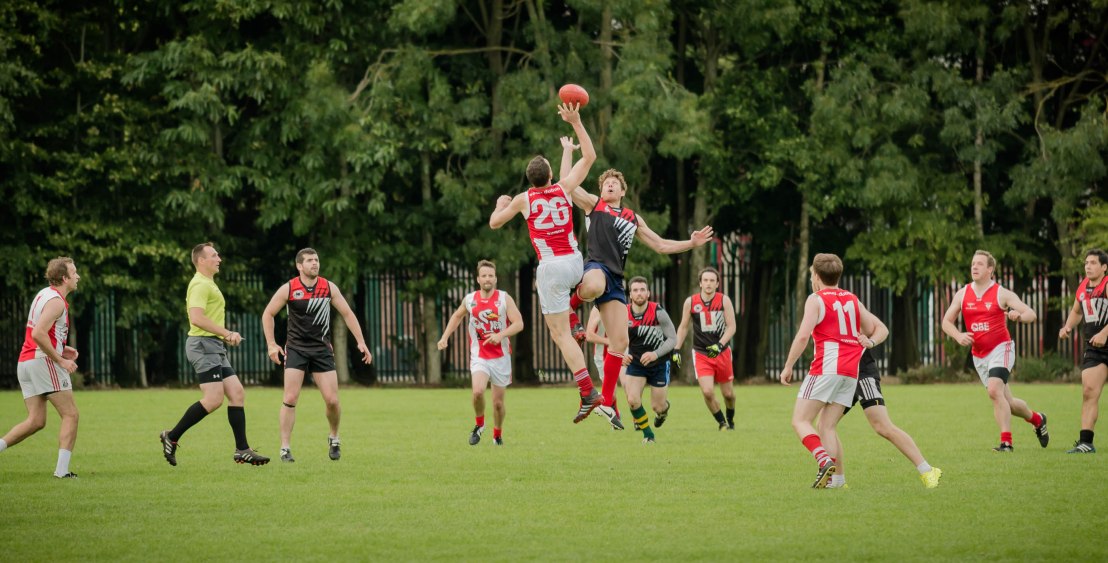
In both 2005 and 2008, the Irish team (AKA the Green Machine) finished in fourth place, suffering losses to both PNG and the US in ’05 and falling to New Zealand during round one of the finals in ’08. However, Ireland rebounded three years later, taking home the 2011 IC title with another nice win over PNG. The Green Machine/Warriors are one of the most successful IC teams ever, as they’ve never finished below fourth place overall and are tied with PNG for the most premierships.
The women’s national team, the Banshees, was also an inaugural member of the women’s IC in 2011, winning the Grand Final that year and finishing as runners-up to Canada in 2014.
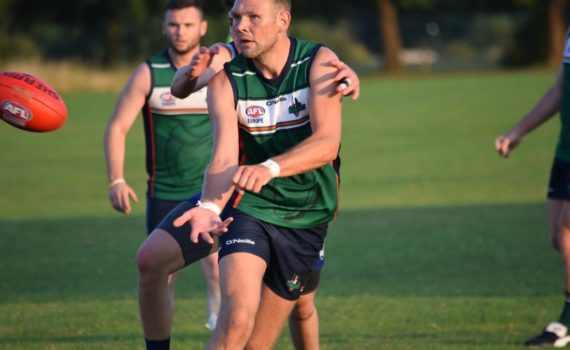
While Gaelic football still dominates the local media coverage and captivates spectators, the future of Aussie rules in Ireland still looks bright, due to the triennial International Rules Series, the emergence of several Gaelic converts in the AFL, and the chance to compete abroad at the International Cup. There are roughly 150 registered Irish footy players, as well as a junior development program.
AUSTRALIAN RULES FOOTBALL LEAGUE OF IRELAND- Belfast Redbacks
- Dublin Demons
- Galway Magpies
- Leeside Lions
- North Leinster Giants
- South Dublin Swans
- Dermott Brereton (played 1982-1992) — One of the greatest goalkickers ever, Brereton is a first generation Irish Australian who played in 189 career games for the Hawthorn Hawks, winning five VFL premierships during that time. After briefly attempting a comeback with Sydney and Collingwood in the mid-90s, Brereton permanently retired and is now a prominent radio and TV commentator.
- Jock McHale (played 1903-1920) — The son of Irish immigrants to Sydney, McHale mostly grew up in Melbourne and played for Collingwood during the VFL’s infancy. However, he is best remembered for his 714-game coaching career with the Pies, which lasted over two decades and resulted in seven premierships. McHale passed away of a heart attack in 1970 and was posthumously named as a Legend in the AFL Hall of Fame.
- Tadhg Kennelly (played 2001-2008) — An athletic 6’3″ defender, Kennelly made history with the Sydney Swans in 2005, when he became the first born-and-raised Irishman to win an AFL premiership. Before he transitioned to footy, Kennelly was a stellar underage player for GAA powerhouse club County Kerry.
- Pearce Hanley (played 2008-present) — The son of an Irish father and Welsh mother, Hanley played for GAA’s County Mayo. In 2005, after a positive showing at the International Rules Series, Hanley began to receiving scouting attention from the AFL. He ultimately signed with the Brisbane Lions as a midfielder/defender and played in 129 career games there before being traded to the Gold Coast Suns last year.
- Jim Stynes (played 1987-1998) — Born in Dublin, Stynes spent his entire AFL career with the Melbourne Demons and is considered the first major success in the so-called Irish experiment, playing in 264 career games and winning a Brownlow Medal in 1991. Following his retirement, Stynes became well-known for his charity work and penned two memoirs. He was also selected to the AFL Hall of Fame and named to the Melbourne Team of the Century. Stynes passed away in 2012 at the tragically young age of 45 due to recurring melanoma.
- Ciarán Byrne (played 2014-present) — Byrne is another Gaelic convert who originally made his presence known to the AFL when playing in the International Rules Series. Hailing from County Louth, Byrne signed as a category B international rookie with Carlton in 2013 and has since played in a dozen AFL games, primarily in the half-back line.
- Conor McKenna (played 2015-present) — McKenna hails from County Tyrone, Northern Ireland and played at the minor league level in Gaelic football before deciding to give Aussie rules a try. Now a midfielder for the Essendon Bombers, McKenna has seen more and more senior level footy in recent months, drawing praise for his style of play from ex-Bombers captain Jobe Watson.
- Colm Begley (played 2006-2009) — Begley moved to Australia in 2005 from County Laois and signed with the Brisbane Lions, where he played for three seasons. Unfortunately, injuries marred the latter half of his career; he retired in 2009 and elected to return to Ireland.
- Zach Tuohy (played 2010-present) — Tuohy is one of the more recent Irish success stories. Originally from County Laois, he began his career as a versatile defender with the Carlton Blues before getting traded to Geelong at the end of last season. Tuohy also represented Ireland at both the 2011 and 2013 International Rules Series.

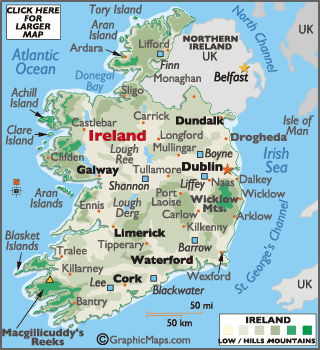 The following story originally appeared on
The following story originally appeared on 

 RSS news
RSS news Twitter
Twitter Facebook
Facebook